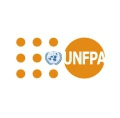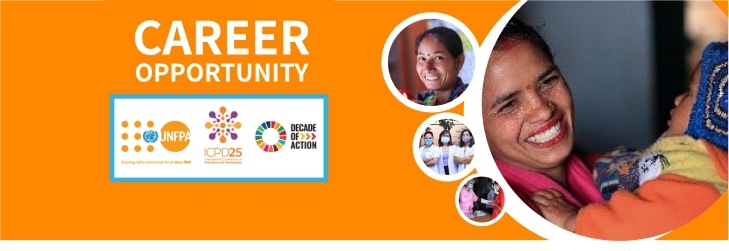


UNFPA, the United Nations Population Fund, is a voluntary-funded international organization with a presence in over 150 countries, including Nepal. UNFPA is guided by the Programme of Action of the 1994 Cairo International Conference on Population and Development (ICPD) and the Sustainable Development Goals. Its mission is to ensure that every pregnancy is wanted, every childbirth is safe and every young person’s potential is fulfilled.
The work of UNFPA is based on the premise that all human beings are entitled to equal rights and protections. We focus on women and young people because these are groups whose ability to exercise their right to sexual and reproductive health is often compromised. Our work is informed by an understanding of population dynamics, human rights and cultural sensitivity.
UNFPA in Nepal
UNFPA support to Nepal began in 1971 and has evolved in response to the changing national contexts. The new country programme is aligned to national priorities, the 2030 Agenda for Sustainable Development, the ICPD Programme of Action, the Convention on the Elimination of All Forms of Discrimination against Women, the UNFPA strategic plan, 2022–2025, and the UNSDCF, 2023–2027. The programme aims to contribute to and accelerate achievement of the 2030 Agenda, in particular SDGs 3 and 5 and the three UNFPA transformative results, in line with the Decade of Action.
UNFPA partners with the Government of Nepal, youth and women’s organizations and development partners to advance its mission. Under the 8th Country Programme and in line with its mandate, UNFPA Nepal is working around the following areas:
Sexual and reproductive health and rights: UNFPA is supporting national efforts in Nepal to improve the sexual and reproductive health of the most marginalized adolescent girls and women. The Fund is largely focusing on youth aged 15-24 and the most marginalized women addressing both the demand and supply sides of reproductive health services to improve access to information and services on maternal health, family planning, and sexually transmitted infections, including HIV.
Gender equality: UNFPA’s support to the Government of Nepal under this overarching theme seeks to ensure that vulnerable groups experience greater self-confidence, respect and dignity. We are building national capacity in the health sector to address gender-based violence (GBV), prevent child marriage and other harmful practices, and working to enhance the knowledge and capacity of men, women and communities to GBV.
Adolescents and youth: Investing in young people, especially the vulnerable and the marginalized, is a priority for UNFPA Nepal. The country has a large adolescent and youth population. Nepal is experiencing a demographic window of opportunity, a ‘youth bulge’. Nepali youth face several development challenges, including access to education, employment, gender inequality, child marriage, youth-friendly health services and adolescent pregnancy. Yet, with investments in their participation and leadership, young people can transform the social and economic fortunes of the country. UNFPA Nepal works with the government and partners to advocate for adolescents and youth’s rights and investments, including education, livelihood skills and health, including sexual and reproductive health.
Population dynamics: Population megatrends at the national and sub-national levels in Nepal continued rapid population growth, population aging, urbanization and migration — not only frame the entire development debate, they demand a reconsideration and re-conceptualization of what will be the main challenges for a new Nepal. Without an adequate understanding of how Nepal is changing from a demographic perspective, forward-looking planning and agenda setting will be of little value. Keeping this in mind, UNFPA Nepal is working with the government to ensure that national, sectoral and decentralized policies and plans address population dynamics and the interlinkages with gender equality, poverty reduction, the needs of young people, and reproductive health, including family planning.
UNFPA, the United Nations Population Fund, is a voluntary-funded international organization with a presence in over 150 countries, including Nepal. UNFPA is guided by the Programme of Action of the 1994 Cairo International Conference on Population and Development (ICPD) and the Sustainable Development Goals. Its mission is to ensure that every pregnancy is wanted, every childbirth is safe and every young person’s potential …
Views: 2183 | This job is expired 8 months, 1 week ago
Job title: Humanitarian Specialist
Level: NO-C
Position Number: 171787
Location: Kathmandu, Nepal
Full/Part time: Full-Time
Fixed term/Temporary: Fixed term
Rotational/Non Rotational: Non-Rotational
Duration: One year (renewable)*
Job Category: Humanitarian & Emergency Response
Apply Before: 08/18/2023, 05:30 PM NPT
The Position:
The Humanitarian Specialist plays a leadership role in humanitarian preparedness and response for the UNFPA Nepal. S/he is responsible for providing technical inputs to the planning, conceptualization, implementation, monitoring and evaluation of humanitarian preparedness and response initiatives in the country. S/he will maintain collaborative relationships with the government line ministries and departments, civil society constituents, the United Nations funds, programmes and specialized agencies and other development organizations. Under the overall guidance of the UNFPA Resident Representative, you will report directly to the Deputy Representative and will work closely with the programme teams and the UNFPA provincial offices among others.
Job Purpose:
Nepal is a priority country for emergency preparedness and response in Asia given its susceptibility to natural hazards such as earthquakes and floods. These vulnerabilities are compounded by poverty and inequality; around a quarter of the population live in extreme poverty and are among the most marginalized as it intersects with caste, ethnicity, gender and sexuality among others. Availability and quality of public services, including health care are limited, due to weak institutional capacities particularly at sub-national level. Nepal’s geographical terrain makes many remote and rural areas hard to reach, further complicating access to services and provision of humanitarian assistance.
Qualifications and Experience
Education:
Advanced university degree in Public Health, Medicine, Humanitarian Action, Social Sciences, International Relations, Political Science, or related disciplines.
Knowledge and Experience:
Languages:
Fluency in English and Nepali (both oral and written) is required. Other UN languages are an asset.
This job has expired.




